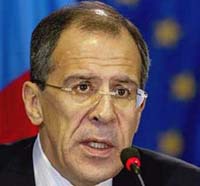Russia's Foreign Ministry orders to close British Council's offices

The Russian Foreign ministry said Friday that the British Council – a nongovernmental organization that acts as the cultural arm of the British Embassy – was ordered to close regional offices in the cities of Yekaterinburg and St. Petersburg by Jan. 1. in response to tight ties between Russia and Britain.
The British Council was accused of violating an international convention on consular affairs and so of operating illegally, the AP said.
Russia ’s Foreign Minister Sergey Lavrov also noted that Britain had drove out Russian diplomats in response to refusal to extradite the main suspect in Litvinenko’s killing, who died in London of poisoning by a radioactive isotope.
"This summer, the British side deliberately began worsening our relations by expelling our diplomats, by stopping contact with the Federal Security Service on anti-terror operations and by refusing to ease visa restrictions," Lavrov said.
"Such things are not tolerated in diplomacy, and as a countermeasure we ordered the suspension" of British Council operations in all cities except Moscow, he told reporters.
"It's obvious that Russian authorities want to close our offices down illegally," British Ambassador Anthony Brenton said later Friday on Ekho Moskvy radio.
Previous Russian complaints about the British Council focused on tax and legalistic issues, but were seen by many as reflecting growing tension between London and Moscow as well as Russian suspicion that Western NGOs aim to stir up discontent.
Russia resents Britain's refusal to extradite tycoon Boris Berezovsky and Chechen separatist envoy Akhmed Zakayev, both of whom are harsh critics of President Vladimir Putin's Kremlin and who were granted asylum in Britain.
Litvinenko was a co-author of a book alleging that the FSB was responsible for the bombings in 1999 – Chechen rebels were charged with. It was also said that the bombings were were cited among the justification for resuming the Chechen war that year. He was given British citizenship in 2000.
Britain seeks the extradition of Andrei Lugovoi, another former FSB agent, to face trial in the killing. Russia says its constitution bans such extraditions.
Russia initially suggested that Lugovoi could be tried at home if Britain presented compelling evidence. That offer was rejected by Britain, and Lugovoi later won a seat in the Russian parliament, giving him immunity from prosecution.
Subscribe to Pravda.Ru Telegram channel, Facebook, RSS!


